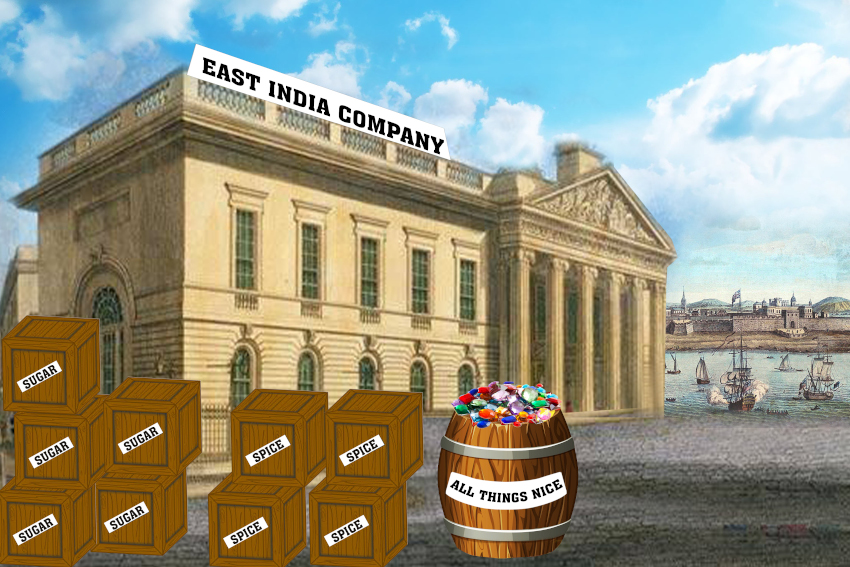Originally chartered as the “Governor and Company of Merchants of London trading into the East Indies”, the East India Company (EIC), rose to account for half of the world’s trade, and later ended up seizing control of the Indian subcontinent. – Wikipedia
Ah, the good old days… when being number one on the Fortune 500 list was as easy as stealing candy from a sleeping baby!
Just ask the directors of the East India Company, and they will tell you funny stories about their fantastic fiduciary adventures in the Far East. About how they first bartered with the natives, and then battered them. About intimate intimidations and investment invadings. About taming bullion bulls and bearer bond bears (just a lot of bull that you had to bear).
They will also tell you that in order to make your profit margins soar and your rate of return roar, you just have to follow 5 easy, occidental-rags to oriental-riches steps.
First Trade, Then Upgrade
You just sail east to an unsuspecting, undeveloped country and pretend to be innocent traders.
“Greetings, short, dark and heathen locals. We are here to buy sugar, spice and all things nice, and in return, we will give you bright and shiny beady baubles.” This strategy worked fine for the West India Company, which bought an island named Manhattan in the Americas for just $24. (And they didn’t pay cash, just 24 dollars worth of beads and trinkets). But the WIC was Dutch, and there’s no telling what these Dutchmen will do – like cutting off their own ears (like Mr. Van Gogh), or refusing to talk when leading rebellions against the Spanish (like William the Silent), or suddenly bursting into guitar solos (like Eddie Van Halen). But to proceed, your next move should be to trade in your trader’s hat for an invader’s hat. And the plush, lush Hindu Kush will be yours to loot. The rest is history.
Don’t Be Needy, Get Greedy
Start business transactions with an innocent line. “Oh I say, could we borrow a cup of tea? And several containers of sugar, salt, cotton and silk to go with it? And be a good chap and throw in a few hundred pounds of opium while you are at it.” Easy transactions with easy-going locals made British businessmen and aristocrats who owned shares in the East India Company quite happy. Especially when they personally tested the quality of the opium shipment. The company’s broad based, big binned boats carted coveted commodities to all colorful and cultured corners of the globe. But greedy shareholders, sitting in a distant and dismal British boardroom, wanted a bigger piece of the spicy Indian pie. “Let’s move on from trading, and get on with the terrorizing and territory-taking.” That’s when real estate in India became a killer business. Literally.
Divide and Stand Aside
Using pre-Freudian psychology, the East India Company easily enticed eager, egocentric emperors to wage war on each other. For instance, just tell King Kohinoor that a neighbouring ruler is planning to demonetize his currency and King K will be like, “What? How dare he? Oh no, if he demonetizes his gold coins, then our gold coins will become worthless too. And our banks will go rupt.” (Hence the expression ‘bankrupt’). Raging, engaging and war-waging will follow, and while King Kohinoor lies puffing and panting on the battlefield, the East India Company will pick up the pieces, especially miscellaneous items like crowns, thrones and gold coins (demonetized or otherwise). This is classic anger-management strategy, where you manage the anger of others for your benefit. After all, all’s fair in love and entrepreneurial empire enhancing.
Conquer. And profits will go bonkers.
Now let’s check our checklist. Expropriate land – check. Enslave locals – check. Extract blood, sweat and tears – check. Export all-you-can-grab – check. Earn excessive profits – check. Thanks to little kings with big egos and invading visitors who came to India to paint the towns blood red, the East India Company was able to grab property, power, profits and make a pretty penny prettier. But the best part – though you pay the loyal local labour a pittance, you still get to hit them with GST. (This GST, or George the Second Tax, is what kept the British machinery well oiled and the British monarchy well spoiled.)
Install Might, Instill Fright
Meanwhile, Company board members gathered at the Rob-The-Orient Club in Greater London to discuss progress and pilfered profits.
“I say, old chap, we did a rather nice hostile takeover – of the entire Indian subcontinent.”
“That was the easy part. Now we need to keep the natives subtly subdued and domestically down’n’out. For which we need a large force of crowd-control soldiers.”
“Hmm… Our British lads will demand tea breaks, beer allowances, wounded-in-the-line-of-duty benefits, visits to England, not to mention high salaries – no, that just won’t do.”
“I say, why not use the natives for this? These lowly locals have low expectations so we could give them low wages and lower benefits.”
“Brilliant, old chap. And we should advertise. ‘The Company is looking for good, brown men willing to suppress depressed fellow Indians’. How’s that for a slogan?”
By 1803 the East India Company’s private army had over 260,000 soldiers… twice the size of the British military. And naturally, all subservient subalterns and stepped-on sepoys were Indians. But if there should be a silver lining to this sad history, it is this. Soldiering, peoning, clerking and menial-multi-tasking for the East India Company was the first instance of Indians working for a foreign enterprise. And the start of a wonderful tradition known as Outsourcing.
But the sun has set on the East India Company. Now India does not have to play fun games like ‘Hide your jewels in my crown’. But wait a cotton picking minute! The descendant of an East India Company’s employee is back in the global game today. Mr. George Biden, a Captain in the East India Company, took all the cotton picked (but not necessarily in a minute) to distant destinations for power and profits. Now his great, great, great, great, great (please note that these are not adjectives, just a genealogical expression) grandson, President Biden, sits in the world’s most powerful seat. Let’s hope that instead of carting off stuff by the shiploads like his ancestor, President Biden gives India a few benefits – like extra visas and more project outsourcing. But President Biden has already given Indians something valuable – an important lesson in democracy. His victory in the polls indicates that nations which veer toward extreme political ideologies tend to recalibrate their democratic principles and straighten out faltering civil liberties.
So here’s to the company that left. And cheers to the company you keep!






 Users Today : 1
Users Today : 1
Leave a Reply